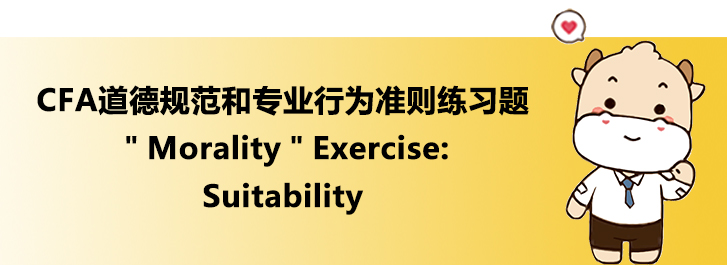 Questions 1:
Questions 1:

 Questions 2:
Questions 2:


 Questions 1:
Questions 1:
 Questions 2:
Questions 2:

1、凡本网站注明“来源高顿教育”或“来源高顿网校”或“来源高顿”,的所有作品,均为本网站合法拥有版权的作品,未经本网站授权,任何媒体、网站、个人不得转载、链接、转帖或以其他方式使用。
2、经本网站合法授权的,应在授权范围内使用,且使用时必须注明“来源高顿网校”或“来源高顿”,并不得对作品中出现的“高顿”字样进行删减、替换等。违反上述声明者,本网站将依法追究其法律责任。
3、本网站的部分资料转载自互联网,均尽力标明作者和出处。本网站转载的目的在于传递更多信息,并不意味着赞同其观点或证实其描述,本网站不对其真实性负责。
4、如您认为本网站刊载作品涉及版权等问题,请与本网站联系(邮箱fawu@gaodun.com,电话:021-31587497),本网站核实确认后会尽快予以处理。
财务报告与分析中章节的设置是循序渐进、逐层深入的,前面介绍的术语在后面还会有详细的解释与探讨。由于财务报告与分析本身自立体系,它是上市公...
2021-09-13CFA财务报表分析练习题"Financial Report":Inventories。财务报告与分析中章节的设置是循序渐进、逐层深入的,前面介绍的术语在后面还会有详细的解释与探...
2021-08-09财务报告与分析中章节的设置是循序渐进、逐层深入的,前面介绍的术语在后面还会有详细的解释与探讨。由于财务报告与分析本身自立体系,它是上市公...
2021-08-09CFA财务报表分析练习题"Financial Report":Long-Lived Assets。财务报告与分析中章节的设置是循序渐进、逐层深入的,前面介绍的术语在后面还会有详细的解释...
2021-08-03CFA财务报表分析练习题"Financial Report":Non-Current (Long-Term) Liabilities。财务报告与分析中章节的设置是循序渐进、逐层深入的,前面介绍的术语在后面还会...
2021-08-03CFA财务报表分析练习题"Financial Report":Understanding Balance Sheets。财务报告与分析中章节的设置是循序渐进、逐层深入的,前面介绍的术语在后面还会有详...
2021-08-02CFA财务报表分析练习题"Financial Report":Understanding Income Statements。财务报告与分析中章节的设置是循序渐进、逐层深入的,前面介绍的术语在后面还会有...
2021-07-15CFA财务报表分析练习题"Financial Report":Financial Reporting Standards。财务报告与分析中章节的设置是循序渐进、逐层深入的,前面介绍的术语在后面还会有详...
2021-07-15CFA财务报表分析练习题"Financial Report":Financial Reporting Quality。财务报告与分析中章节的设置是循序渐进、逐层深入的,前面介绍的术语在后面还会有详细...
2021-07-08为什么说随机模型更容易受管理人员主观判断的影响
老师,超定额废品损失是什么?
老师,题目说a是3阶矩阵有3各不同特征值,这能推出什么结论,和秩有怎样的关系呢,这里想不过来
叉车的最低折旧年限是多少?
销售部门上缴1万元,未存入银行 。这个不需要在对账单里+1吗
为什么说随机模型更容易受管理人员主观判断的影响
老师,超定额废品损失是什么?
老师,题目说a是3阶矩阵有3各不同特征值,这能推出什么结论,和秩有怎样的关系呢,这里想不过来
叉车的最低折旧年限是多少?
销售部门上缴1万元,未存入银行 。这个不需要在对账单里+1吗
财务报告与分析中章节的设置是循序渐进、逐层深入的,前面介绍的术语在后面还会有详细的解释与探讨。由于财务报告与分析本身自立体系,它是上市公司和报表使用人之间沟通交流的语言,所以学起来与外语学习有几分相似。...
2021-09-14财务报告与分析中章节的设置是循序渐进、逐层深入的,前面介绍的术语在后面还会有详细的解释与探讨。由于财务报告与分析本身自立体系,它是上市公司和报表使用人之间沟通交流的语言,所以学起来与外语学习有几分相似。...
2021-09-16CFA财务报表分析练习题"Financial Report":Financial Analysis Techniques。财务报告与分析中章节的设置是循序渐进、逐层深入的,前面介绍的术语在后面还会有详细的解释与探讨。由于财务报告与分析本身自立体系,它是上市公司和报表使用人之间沟通交流的语言,所以学起来与外语学习有几分相似。...
2021-09-14财务报告与分析中章节的设置是循序渐进、逐层深入的,前面介绍的术语在后面还会有详细的解释与探讨。由于财务报告与分析本身自立体系,它是上市公司和报表使用人之间沟通交流的语言,所以学起来与外语学习有几分相似。...
2021-09-13财务报告与分析中章节的设置是循序渐进、逐层深入的,前面介绍的术语在后面还会有详细的解释与探讨。由于财务报告与分析本身自立体系,它是上市公司和报表使用人之间沟通交流的语言,所以学起来与外语学习有几分相似。...
2021-09-13CFA财务报表分析练习题"Financial Report":Financial Analysis。财务报告与分析中章节的设置是循序渐进、逐层深入的,前面介绍的术语在后面还会有详细的解释与探讨。...
2021-06-29CFA财务报表分析练习题"Financial Report":Financial Reporting。财务报告与分析中章节的设置是循序渐进、逐层深入的,前面介绍的术语在后面还会有详细的解释与探讨。...
2021-06-29CFA财务报表分析练习题"Financial Report":MD&A。财务报告与分析中章节的设置是循序渐进、逐层深入的,前面介绍的术语在后面还会有详细的解释与探讨。...
2021-06-29CFA财务报表分析练习题"Financial Report":Income statement。财务报告与分析中章节的设置是循序渐进、逐层深入的,前面介绍的术语在后面还会有详细的解释与探讨。...
2021-06-29CFA财务报表分析练习题"Financial Report":Inventory valuation method.财务报告与分析中章节的设置是循序渐进、逐层深入的,前面介绍的术语在后面还会有详细的解释与探讨。...
2021-06-29CFA财务报表分析练习题"Financial Report":Intangible assets。财务报告与分析中章节的设置是循序渐进、逐层深入的,前面介绍的术语在后面还会有详细的解释与探讨。...
2021-06-29CFA财务报表分析练习题"Financial Report":Understanding Balance Sheets。财务报告与分析中章节的设置是循序渐进、逐层深入的,前面介绍的术语在后面还会有详细的解释与探讨。...
2021-06-29CFA财务报表分析练习题"Financial Report":Tax rate。财务报告与分析中章节的设置是循序渐进、逐层深入的,前面介绍的术语在后面还会有详细的解释与探讨。...
2021-06-29CFA财务报表分析练习题"Financial Report":Profit/loss or income。财务报告与分析中章节的设置是循序渐进、逐层深入的,前面介绍的术语在后面还会有详细的解释与探讨。...
2021-06-29CFA财务报表分析练习题"Financial Report":A responsibility of the SEC。财务报告与分析中章节的设置是循序渐进、逐层深入的,前面介绍的术语在后面还会有详细的解释与探讨。...
2021-06-29